There have been no cooperatives, businesses and individuals in Can Tho granted the codes so far. However, the sub-department has received six registration dossiers.

The Mekong Delta city of Can Tho expects to export its first batch of durians to China next year.
In preparation, the municipal Sub-Department for Plant Production and Protection on Wednesday guided cooperatives and cooperative groups in Phong Dien District to register for planting area codes, meeting requirements for exports to China through the official channel.
There have been no cooperatives, businesses and individuals in Can Tho granted the codes so far. However, the sub-department has received six registration dossiers.
Can Tho is home to 2,500ha of durians, mainly in Phong Dien District with 2,150ha, which provides about 14,200 tonnes of durians for the market each year.
Deputy Director of the municipal Department of Agriculture and Rural Development Tran Thai Nghiem said there is only one cooperative in Phong Dien eligible to be granted the code, suggesting local farmers form production groups to be eligible.
After four years of negotiations, on July 11, a protocol on phytosanitary requirements for Vietnamese durians exported to China was signed - an essential condition for Vietnamese durians to have a sustainable import market.
The protocol stipulates that all growing areas registered for Chinese exports build quality management and traceability systems, apply Good Agricultural Practices (GAP), and ensure clean cultivation areas.
In addition, they must apply integrated pest management (IPM) programmes, including pest surveillance, chemical or biological control, and other farming practices.
China is still the largest importer of Vietnamese durians, but this fruit is mainly exported to China via border gates. — VNS





